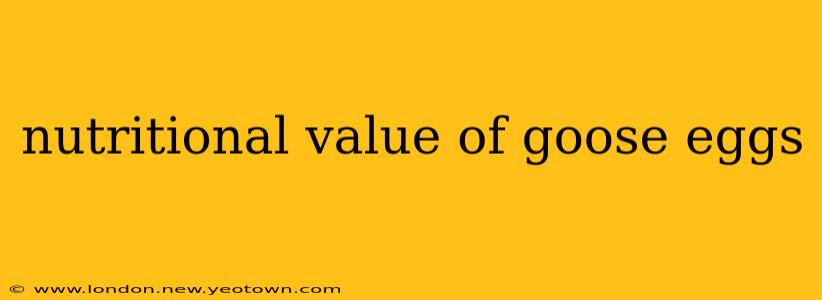Goose eggs, often overlooked in favor of their chicken counterparts, are a nutritional powerhouse brimming with vitamins, minerals, and proteins. Their rich, creamy yolks and generous size make them a culinary delight and a surprisingly healthy choice. Let's dive into the fascinating world of goose egg nutrition, exploring their benefits and answering some common questions.
What are the nutritional benefits of goose eggs?
Goose eggs significantly surpass chicken eggs in size, boasting approximately 1.5 to 2 times the volume. This translates to a higher concentration of nutrients. They are packed with high-quality protein, essential for building and repairing tissues. Beyond protein, goose eggs are excellent sources of vitamins like A, D, and E, along with vital minerals such as iron, zinc, and selenium. These nutrients contribute to various bodily functions, supporting immune health, bone strength, and overall well-being. The high fat content, primarily unsaturated, provides energy and contributes to healthy cell function. However, moderation is key, as the higher fat and cholesterol content compared to chicken eggs should be considered as part of a balanced diet.
How do goose eggs compare to chicken eggs nutritionally?
This is a frequently asked question, and the answer lies in the sheer size difference. A single goose egg contains roughly the equivalent nutrients of two to three chicken eggs. While the ratio of nutrients might be similar, the quantity is significantly higher. For instance, a goose egg provides a more substantial amount of protein, vitamins, and minerals in a single serving. The higher fat content is also a distinguishing factor. Remember though, both goose and chicken eggs offer considerable nutritional value. The choice ultimately depends on individual dietary preferences and needs.
Are goose eggs healthier than chicken eggs?
The "healthier" egg isn't a simple yes or no answer. Both goose and chicken eggs offer valuable nutrients. Goose eggs offer a higher concentration of nutrients due to their larger size. However, this also means a higher caloric and fat content. Chicken eggs, being smaller, offer a lower calorie and fat count. Ultimately, the healthiest choice depends on your individual dietary needs and overall health goals. A balanced diet incorporating both types of eggs (in moderation) could offer a well-rounded nutritional profile.
What are the potential health benefits of consuming goose eggs?
The rich nutritional profile of goose eggs translates to various potential health benefits. The high protein content aids muscle growth and repair, while the vitamins and minerals contribute to immune system function and bone health. The presence of antioxidants helps combat cell damage, while the healthy fats support brain function and overall cellular health. However, it's crucial to remember that these are potential benefits, and individual responses may vary. A balanced diet and a healthy lifestyle are still paramount for optimal well-being.
Are there any downsides to eating goose eggs?
While incredibly nutritious, goose eggs do have some downsides to consider. The higher cholesterol and saturated fat content compared to chicken eggs should be a consideration for individuals watching their cholesterol levels. The larger size can also make them less convenient for some recipes. As with any food, moderation is key to reaping the benefits without overdoing it.
Conclusion: Embrace the Goose Egg's Nutritional Bounty
Goose eggs, with their impressive nutritional profile, offer a unique and delicious addition to a balanced diet. Their higher nutrient density compared to chicken eggs makes them a compelling choice, but it's crucial to be mindful of their higher fat and cholesterol content. Including goose eggs as part of a varied and healthy eating plan can contribute to overall well-being. Remember to consult with a healthcare professional or registered dietitian to determine how goose eggs fit best into your individual dietary needs.

